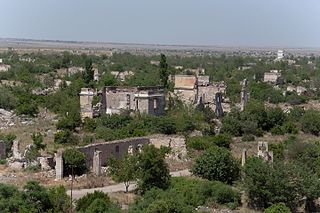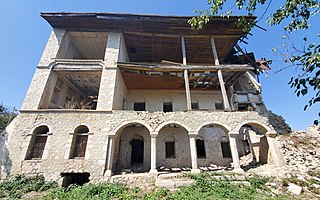Azerbaijan is administratively divided into 67 districts and 11 cities that are subordinate to the Republic. Out of these districts and cities, 7 districts and 1 city are located within the Nakhchivan Autonomous Republic. The districts are further divided into municipalities.

Aghdam District is one of the 66 administrative divisions of Azerbaijan. It is located in the west of the country and belongs to the Karabakh Economic Region. The district borders the districts of Khojaly, Kalbajar, Tartar, Khojavend, Aghjabadi, and Barda. Its capital is de jure Aghdam, though the current de facto capital is Quzanlı. As of 2020, the district had a nominal population of 204,000.

Shusha or Shushi is a city in Azerbaijan, in the region of Nagorno-Karabakh. Situated at an altitude of 1,400–1,800 metres (4,600–5,900 ft) in the Karabakh mountains, the city was a mountain resort in the Soviet era.

Shusha District is one of the 66 districts of Azerbaijan. It is located in the west of the country and belongs to the Karabakh Economic Region. The district borders the districts of Khojaly, Lachin, and Khojavend. Its capital and largest city is Shusha. As of 2020, the district had a nominal population of 34,700. Finally villages of Malıbəyli, Aşağı Quşçular and Yuxarı Quşçular were transferred to Khojaly District according to passing law in 5 December 2023.

Fuzuli is a city and the capital of the Fuzuli District of Azerbaijan.

Holy Savior Cathedral, commonly referred to as Ghazanchetsots, is an Armenian Apostolic cathedral in Shusha in Azerbaijan. It is the cathedra of the Diocese of Artsakh of the Armenian Apostolic Church. Standing 35 metres (115 ft) high, Ghazanchetsots is one of the largest Armenian churches in the world. A landmark of Shusha and the Karabakh region, and of Armenian cultural and religious identity, it was listed as a cultural and historical monument of the former breakaway Republic of Artsakh.

Aghdam is a town and the nominal capital of the Aghdam District of Azerbaijan. Founded in the 18th century, it was granted city status in 1828 and grew considerably during the Soviet period. Aghdam lies 26 km from Stepanakert at the eastern foot of the Karabakh Range, on the outskirts of the Karabakh plain.

Zarysly is a village located in Shusha district of Azerbaijan, and is the center of the Zarisli rural administrative-territorial district.

Yukhari Govhar Agha Mosque (Azerbaijani: Yuxarı Gövhər Ağa məscidi, is a mosque located in the city of Shusha, Azerbaijan. The mosque also bears the name Boyuk Juma of Govhar Agha.

Shahbulag Castle is an 18th-century fortress near Aghdam in Azerbaijan built by the Karabakh Khan Panah Ali.

Habib bey Haji Yusif oglu Salimov was the first Chief of General Staff of Azerbaijani Armed Forces of the Azerbaijan Democratic Republic.

Shusha Realni School was a school with six classes, located in Shusha, Azerbaijan, in the disputed region of Nagorno-Karabakh. The school's building phase was completed in 1881. The school stopped its work following the capture of Shusha by Armenian forces in 1992 and now lies in a ruined state.
Azerbaijan State Museum of History of Karabakh was a museum located in Shusha, Azerbaijan.

The Battle of Shusha was the final and decisive battle of the Second Nagorno-Karabakh War, fought between the armed forces of Azerbaijan and the self-proclaimed Republic of Artsakh, militarily supported by Armenia, over the control of the city of Shusha. The battle is considered one of the bloodiest battles of the war.

The Mehmandarovs' House is a historic palace-type residential complex located in Shusha. It is one of the most interesting examples of the 18th century's civil architecture of Azerbaijan. The residential complex, which originally belonged to the Armenian Lieutenant Yesai Gharamyants during the 19th century, came into the possession of the Mehmandarov family in 1918. It includes the Large Residential Building, the Small Residential Building and the Family Mosque. The complex is fenced with stone walls. It was previously the site of the Shusha Museum of History.
Following the Second Nagorno-Karabakh War, and in accordance with 2020 Nagorno-Karabakh ceasefire agreement, Republic of Azerbaijan re-established authority on the part of the territories, previously de facto controlled by the breakaway Republic of Artsakh, which allowed Azerbaijan to begin construction projects and rehabilitation in areas of the Karabakh, many of which had been practically leveled since Azerbaijan lost control of them in the 1990s.

Haji Gulular Palace is a historical and architectural monument located in the city of Shusha. The palace was built in 1849 in the Chukhur mehelle by the order of the merchant of the second guild Gulu Mahammadali oghlu.

Asad-bey's House is a historical and architectural monument of the early 18th century being located in Shusha. The house belonged to one of the famous representatives of the noble family of Shusha - to Asad-bey.

Gurdlar neighbourhood was founded in the 18th century, and is one of the lower quarters of the city of Shusha. There are located the house of Zohrabbeyov, the castle of Gara Boyuk Khanim, as well as the estate of the famous public figure, writer, and teacher Ahmad bey Aghaoglu's of father.

Baba Behbud or Baba bey Behbud Saricali Javanshir was an officer in the National Army of Azerbaijan People's Republic. He also served as an immigrant colonel of Turkish Armed Forces in the Turkish Independence War. He was awarded the Medal of Independence. He participated in the Battle of Askeran and the Karabakh uprising against the occupation after the April invasion.























